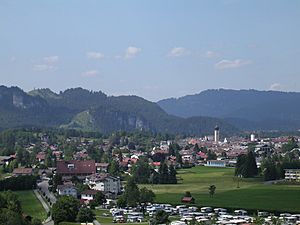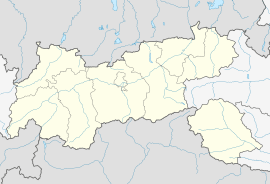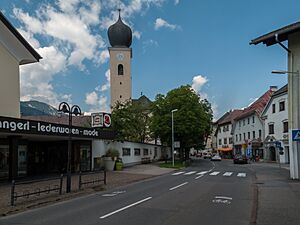Reutte facts for kids
Quick facts for kids
Reutte
Raete (Swabian)
|
||
|---|---|---|
 |
||
|
||
|
.
Location in Tyrol
|
||
| Country | Austria | |
| State | Tyrol | |
| District | Reutte | |
| Area | ||
| • Total | 100.92 km2 (38.97 sq mi) | |
| Elevation | 853 m (2,799 ft) | |
| Time zone | UTC+1 (CET) | |
| • Summer (DST) | UTC+2 (CEST) | |
| Postal code |
6600
|
|
| Area code | 05672 | |
| Vehicle registration | RE | |
| Website | www.reutte.at | |
Reutte is a town in the Austrian state of Tyrol. It is the main town of the Reutte area. Reutte is located by the Lech river. About 6,700 people live there (as of 2018).
Reutte is surrounded by several smaller towns and villages. These include Breitenwang, Ehenbichl, Lechaschau, and Pflach.
Contents
Discovering Reutte's Past
Reutte is on an old Roman road called the Via Claudia Augusta. This road connected Italy to Germany. Another important path, the Tyrolean Salt Road, also passed through the Reutte area.
Reutte was first called "Reuti." On June 5, 1489, it was given special rights as a market town. This meant it could hold markets and trade goods. The people of Reutte celebrate this history every year with a festival in August.
In 2024, Reutte was officially made a town. This was a big step for the community.
Art and Artists in Reutte
In 1692, a painter named Paul Zeiller opened an art workshop in Reutte. This workshop later became an art school. His son, Johann Jakob Zeiller, and his adopted son, Franz Anton Zeiller, both learned to paint there. They became famous artists.
Reutte's Role in History
In 1918, after World War I, there were many challenges in Austria. A lawyer named Dr. Hermann Stern wanted to create a local committee in Reutte. This committee would help manage the district. He believed the people should have more say in how their area was run.
Dr. Stern and others felt that Tyrol, the larger state, was not helping Reutte enough. They wanted more control over their own food and transport. Some even suggested joining Bavaria, a region in Germany.
A temporary committee was formed, and Dr. Stern became its leader. Their goal was to make sure people had the right to govern themselves. Later, a permanent committee was elected. Dr. Stern was chosen as one of the representatives for Reutte.
During World War II, from 1938 to 1945, Austria was part of Germany. There was a small camp near Reutte called "Plansee Breitenwald." In April 1945, American soldiers arrived in Reutte. They expected a fight, but there was little resistance.
Reutte is also famous for a historic surrender. On May 3, 1945, German engineers gave up to the United States Army here. These engineers, including Wernher von Braun, were important for rocket science. They later went to the United States to work on rockets, like the Saturn V.
Today, Reutte is connected to other parts of Tyrol mainly by the Fern Pass. Because of this, its links to Germany and the rest of Europe are very important for trade and travel.
In 2003, a piece of the Neuschwanstein meteorite was found near Reutte. This was an exciting discovery!
Reutte's Coat of Arms
The coat of arms for Reutte has three fir trees on three hills. This shows that the area has many trees. The name "Reutte" comes from an old word meaning "clearing" or "glade" in a forest. The red and white stripes in the background represent the state of Tyrol and the country of Austria.
Reutte's Weather
Reutte has a varied climate throughout the year. Summers are generally mild, while winters are cold with a lot of snow. The town gets a good amount of sunshine, especially in the warmer months.
| Climate data for Reutte (1991–2020) | |||||||||||||
|---|---|---|---|---|---|---|---|---|---|---|---|---|---|
| Month | Jan | Feb | Mar | Apr | May | Jun | Jul | Aug | Sep | Oct | Nov | Dec | Year |
| Record high °C (°F) | 18.0 (64.4) |
18.1 (64.6) |
23.0 (73.4) |
25.0 (77.0) |
29.0 (84.2) |
33.8 (92.8) |
35.1 (95.2) |
32.5 (90.5) |
30.0 (86.0) |
26.0 (78.8) |
22.9 (73.2) |
18.7 (65.7) |
35.1 (95.2) |
| Mean daily maximum °C (°F) | 3.3 (37.9) |
5.2 (41.4) |
8.4 (47.1) |
13.0 (55.4) |
16.4 (61.5) |
20.2 (68.4) |
21.3 (70.3) |
21.1 (70.0) |
17.6 (63.7) |
13.3 (55.9) |
8.1 (46.6) |
3.7 (38.7) |
12.6 (54.7) |
| Daily mean °C (°F) | −1.2 (29.8) |
−0.1 (31.8) |
3.6 (38.5) |
7.5 (45.5) |
11.6 (52.9) |
15.0 (59.0) |
16.8 (62.2) |
16.6 (61.9) |
12.6 (54.7) |
8.8 (47.8) |
3.6 (38.5) |
−0.2 (31.6) |
7.9 (46.2) |
| Mean daily minimum °C (°F) | −5.4 (22.3) |
−5.4 (22.3) |
−1.5 (29.3) |
2.0 (35.6) |
5.9 (42.6) |
9.8 (49.6) |
11.0 (51.8) |
11.0 (51.8) |
7.7 (45.9) |
3.7 (38.7) |
−0.8 (30.6) |
−4.2 (24.4) |
2.8 (37.1) |
| Record low °C (°F) | −25.4 (−13.7) |
−20.8 (−5.4) |
−23.0 (−9.4) |
−9.0 (15.8) |
−4.0 (24.8) |
−2.0 (28.4) |
2.0 (35.6) |
1.6 (34.9) |
−3.0 (26.6) |
−8.5 (16.7) |
−18.1 (−0.6) |
−22.0 (−7.6) |
−25.4 (−13.7) |
| Average precipitation mm (inches) | 83.5 (3.29) |
71.7 (2.82) |
96.9 (3.81) |
86.3 (3.40) |
147.1 (5.79) |
179.0 (7.05) |
181.0 (7.13) |
189.6 (7.46) |
121.4 (4.78) |
92.6 (3.65) |
83.9 (3.30) |
85.4 (3.36) |
1,418.4 (55.84) |
| Average snowfall cm (inches) | 60.6 (23.9) |
59.6 (23.5) |
43.9 (17.3) |
16.6 (6.5) |
1.2 (0.5) |
0.0 (0.0) |
0.0 (0.0) |
0.0 (0.0) |
0.0 (0.0) |
4.8 (1.9) |
33.5 (13.2) |
54.8 (21.6) |
275 (108.4) |
| Average precipitation days (≥ 1.0 mm) | 10.8 | 10.2 | 12.2 | 11.6 | 14.6 | 15.9 | 16.1 | 15.0 | 12.3 | 10.5 | 10.6 | 11.7 | 151.5 |
| Average snowy days (≥ 1.0 cm) | 28.2 | 25.2 | 19.5 | 4.6 | 0.4 | 0.0 | 0.0 | 0.0 | 0.0 | 1.7 | 10.0 | 22.4 | 112 |
| Average relative humidity (%) (at 14:00) | 71.2 | 64.7 | 59.9 | 58.0 | 60.3 | 61.6 | 62.4 | 64.1 | 66.4 | 66.9 | 70.8 | 74.1 | 65.0 |
| Mean monthly sunshine hours | 105.5 | 107.0 | 140.7 | 153.8 | 191.3 | 170.0 | 186.0 | 186.5 | 163.3 | 139.3 | 92.8 | 81.2 | 1,717.4 |
| Source: Central Institute for Meteorology and Geodynamics (sun 1971–2000) | |||||||||||||
Population Growth in Reutte
Reutte's population has grown steadily over the years. In 1869, there were just over 1,400 people. By 2018, the population had grown to more than 6,700. This shows how the town has developed over time.
| Historical population | ||
|---|---|---|
| Year | Pop. | ±% |
| 1869 | 1,411 | — |
| 1880 | 1,470 | +4.2% |
| 1890 | 1,495 | +1.7% |
| 1900 | 1,576 | +5.4% |
| 1910 | 1,924 | +22.1% |
| 1923 | 1,966 | +2.2% |
| 1934 | 2,400 | +22.1% |
| 1939 | 2,476 | +3.2% |
| 1951 | 3,478 | +40.5% |
| 1961 | 4,285 | +23.2% |
| 1971 | 5,113 | +19.3% |
| 1981 | 5,132 | +0.4% |
| 1991 | 5,306 | +3.4% |
| 2001 | 5,719 | +7.8% |
| 2006 | 5,797 | +1.4% |
| 2011 | 5,912 | +2.0% |
| 2014 | 6,210 | +5.0% |
| 2018 | 6,708 | +8.0% |
Visiting Reutte
Reutte is a popular place for holidays. You can easily reach it by train from places like Garmisch-Partenkirchen and Kempten, Germany.
The town is a great spot for both cultural trips and skiing. It is close to the famous Bavarian Castles and the old Ehrenberg ruins. This makes Reutte a fun place to explore history and enjoy outdoor activities.
Sister City
Since 1991, Reutte has had a special connection with Esashi in Japan. They are called "twin towns" or "sister cities." This means they share cultural exchanges and friendly ties.
See Also
 In Spanish: Reutte para niños
In Spanish: Reutte para niños
 | James B. Knighten |
 | Azellia White |
 | Willa Brown |





